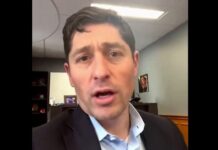The world of unidentified flying objects (UFOs) has always been shrouded in mystery and controversy. Recently, retired Air Force Maj. David Grusch, a former U.S. intelligence and military official, has come forward with astonishing claims about a government cover-up of a UFO retrieval program. Grusch insists that he has “firsthand access” to information that he cannot publicly discuss at this time.
The Whistleblower’s Revelations
During an interview on BBC Radio 4’s “The World Tonight,” Grusch, accompanied by his lawyer, defended his claims against detractors who question his reliance on second-hand information. He revealed that he and his colleagues interviewed 40 highly distinguished intelligence and military personnel, both current and former, who were directly involved in the UFO retrieval programs. Those individuals who were willing to share their knowledge were directed to the Intelligence Community inspector general for further investigation.
Grusch’s firsthand access to undisclosed information has raised eyebrows and sparked curiosity. When pressed about how he “knows” the U.S. government is hiding crafts of non-human origin, he stated that there are certain things he cannot discuss publicly at this time. However, he emphasized the importance of public accountability and the need for the government to be held responsible for potentially overclassifying or misclassifying basic scientific knowledge.
Skepticism and Congressional Interest
While some members of Congress, such as Rep. Tim Burchett (R-TN), are eager to investigate Grusch’s claims further, skepticism persists. House Intelligence Committee Chairman Mike Turner (R-OH) expressed doubts about the credibility of the whistleblowers, noting that many of them relied on hearsay and lacked direct knowledge of the alleged UFO retrieval programs. Turner emphasized that it would require an extensive cover-up involving thousands of people for such a secretive operation to be occurring.
Grusch, however, countered the notion that the UFO cover-up is solely an American issue. He claimed that other countries and allies, including the Five Eyes alliance, are also involved. While the media reporting bias and societal transparency may differ in the U.S., the UFO phenomenon extends beyond national borders.
Government Motives for Concealment
Grusch provided insights into why the government might want to keep a UFO retrieval program under wraps. He suggested that the secrecy surrounding the subject dates back several decades, with the government adopting a similar approach to the Manhattan Project due to concerns about the potential shock to the world populace. Additionally, the involvement of non-human technology in military and weapons development could pose significant challenges and risks, leading to the decision to keep the program classified for many years.
Official Denial and Investigations
The Department of Defense (DoD) has issued a statement through its All-domain Anomaly Resolution Office (AARO), denying the existence of any verifiable information that substantiates the claims of a UFO retrieval program involving extraterrestrial materials. The DoD maintains that no programs of this nature have ever existed or currently exist. However, Grusch’s allegations have triggered a whistleblower reprisal investigation, and he has provided classified information, including program names and locations, to the Intelligence Community Inspector General and congressional intelligence committee staff.
The Whistleblower’s Motivation
Grusch explained that his decision to come forward stems from a sense of duty and a desire for truth and accountability. He believes that it is crucial for the public to understand their place in the universe and for the government to be transparent in its classification of scientific knowledge. Grusch’s background as a former National Geospatial-Intelligence Agency co-lead in Unidentified Anomalous Phenomena (UAP) and trans-medium object analysis lends credibility to his claims.
The BBC Radio Interview and AARO Director’s Response
During the interview with BBC Radio, Grusch addressed AARO Director Sean Kirkpatrick’s statement that the congressional UAP hearing was insulting to AARO team members. Grusch clarified that he was not part of the core team but had worked under Kirkpatrick’s oversight. He attributed any miscommunication to lost in translation or misconstrued information.


